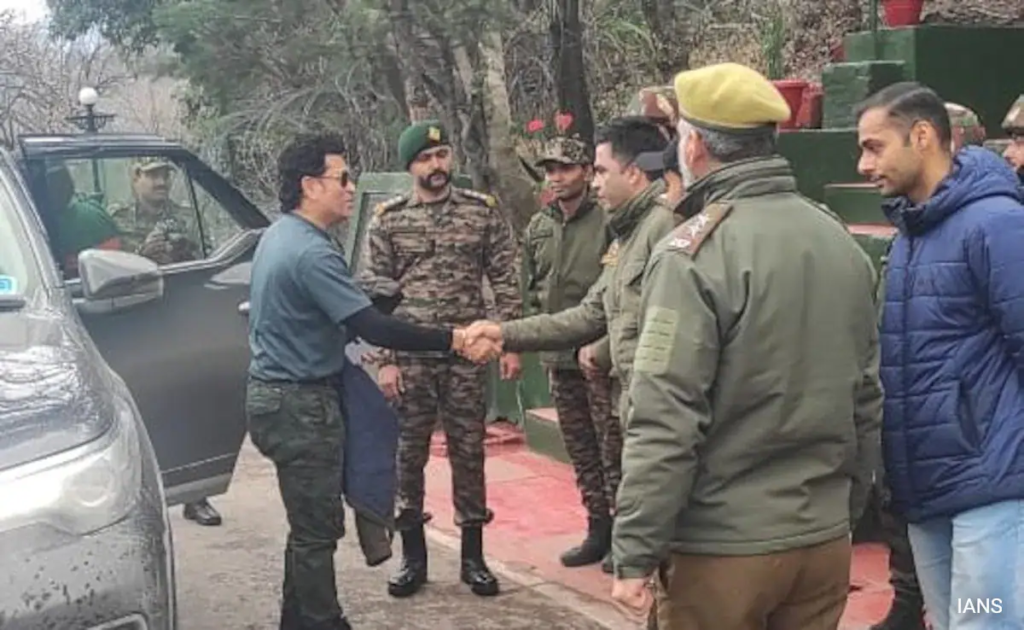Guard in Great Sachin Tendulkar’s
Guard-In a devastating turn of events, a State Reserve Police Force jawan (SRPF) attached to the security detail of cricket legend Bharat Ratna Sachin Tendulkar allegedly shot himself in the neck at his native home in Jamner town, Maharashtra. The tragic incident has left the community reeling in shock and sorrow.
Guard-The man behind the uniform was identified as Prakash Kapde, aged 39, who had recently embarked on a brief vacation to his ancestral place. Survived by his aged parents, wife, two minor children, a brother, and other family members, Kapde’s untimely demise has cast a shadow of grief over his loved ones and colleagues alike.
Guard-The news of Kapde’s self-inflicted gunshot wound has sent shockwaves through the tight-knit community of Jalgaon, Maharashtra. As a member of the State Reserve Police Force, Kapde was entrusted with the crucial responsibility of safeguarding one of India’s most beloved icons, Sachin Tendulkar. However, behind the uniform and the duty-bound facade, Kapde was a husband, a father, a son, and a brother – a man whose tragic end has left many questioning the unseen burdens he might have carried

Guard-The news of Kapde’s self-inflicted gunshot wound has sent shockwaves through the tight-knit community of Jalgaon, Maharashtra. As a member of the State Reserve Police Force, Kapde was entrusted with the crucial responsibility of safeguarding one of India’s most beloved icons, Sachin Tendulkar. However, behind the uniform and the duty-bound facade, Kapde was a husband, a father, a son, and a brother – a man whose tragic end has left many questioning the unseen burdens he might have carried.
Guard-The circumstances leading to Kapde’s decision to take his own life remain shrouded in mystery. While initial reports suggest that he used his service gun to inflict the fatal wound, the underlying reasons behind this drastic action are yet to be fully understood. Was it the weight of familial responsibilities, the pressures of his profession, or a combination of various factors that drove Kapde to such a desperate measure?
Guard-As investigations into the incident unfold, attention is inevitably drawn to the mental health and well-being of individuals like Kapde, who shoulder the weight of protecting public figures like Sachin Tendulkar. The demanding nature of their work, coupled with the constant vigilance required in high-profile security details, can undoubtedly take a toll on one’s psychological health. Yet, the stigma surrounding mental health issues often prevents individuals from seeking the help they desperately need.
Kapde’s tragic demise serves as a stark reminder of the urgent need to prioritize mental health awareness and support systems within law enforcement agencies and other high-stress professions. Beyond the uniform, these individuals are husbands, wives, parents, and siblings grappling with their own inner demons, often in silence. Creating an environment where seeking help is encouraged rather than stigmatized is crucial in preventing future tragedies like Kapde’s.
Moreover, Kapde’s case highlights the importance of providing adequate mental health resources and support networks for those working in high-pressure environments. From regular counseling sessions to stress management programs, investing in the well-being of frontline personnel is not just a moral imperative but also a strategic necessity. After all, individuals like Kapde are entrusted with safeguarding the lives of others; it’s only fair that they receive the same level of care and attention in return.
Beyond the immediate shock and grief, Kapde’s passing also raises broader questions about the welfare and support systems available to personnel in the State Reserve Police Force and similar organizations across the country. Are there sufficient mechanisms in place to identify and address mental health issues among officers? Are there avenues for seeking help and support without fear of judgment or reprisal? These are the critical questions that must be addressed in the wake of this tragedy.
As the community mourns the loss of Prakash Kapde, it’s imperative that his death serves as a catalyst for change – a wake-up call to prioritize the mental health and well-being of those who dedicate their lives to protecting others. Whether it’s through increased awareness, better support systems, or proactive measures to address stress and trauma, there’s much that can be done to prevent similar tragedies in the future.
In the midst of sorrow and disbelief, there’s also an opportunity for reflection and action. Let Prakash Kapde’s legacy be one of resilience, compassion, and a commitment to ensuring that no one else suffers in silence. From his tragic end, may there emerge a renewed dedication to supporting the mental health needs of our frontline heroes, ensuring that they receive the care and attention they rightfully deserve.
